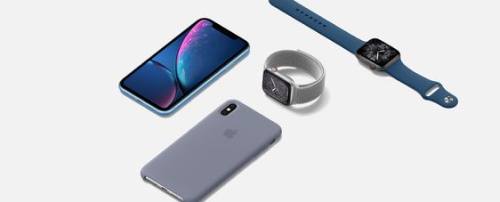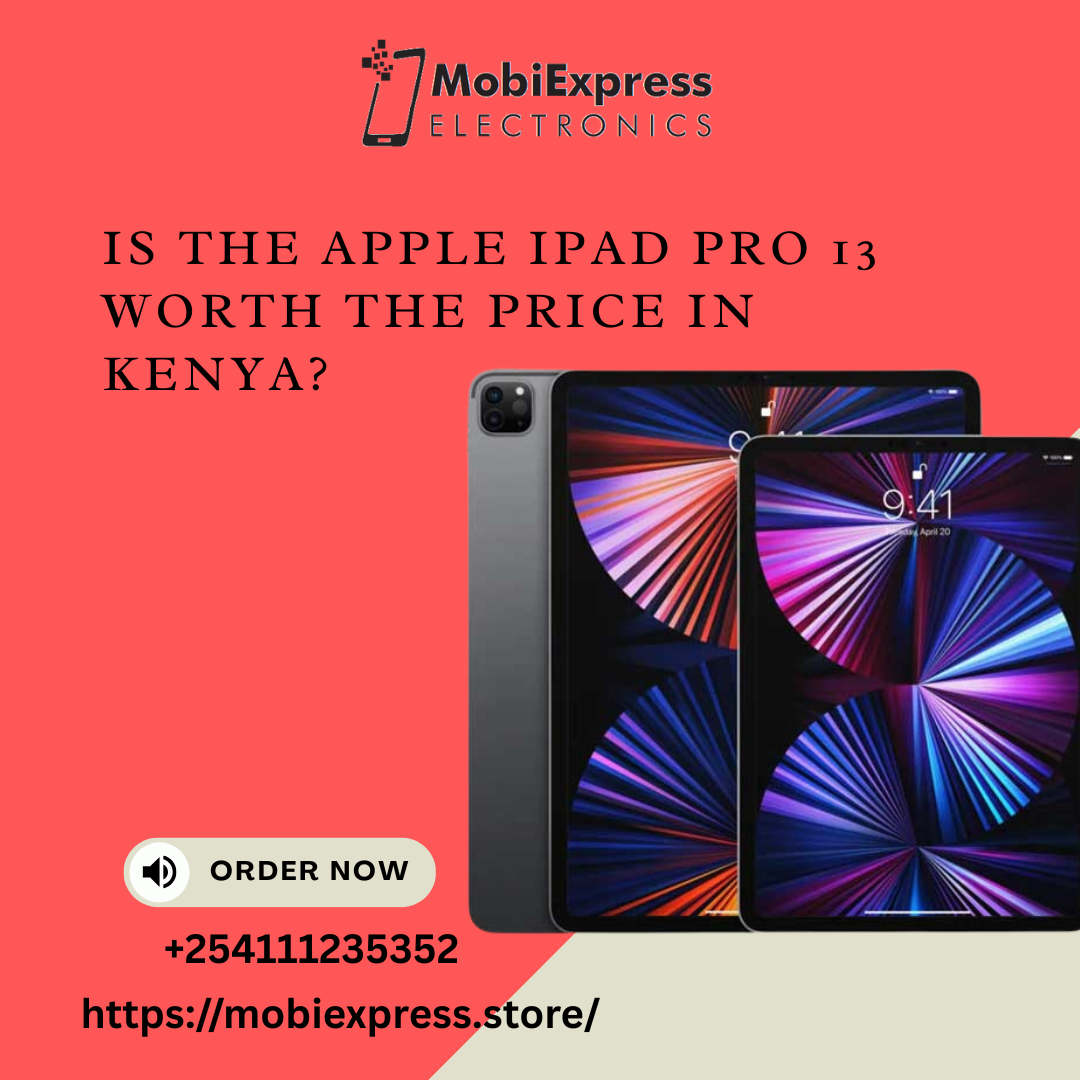Apple’s latest iPad Pro 13-inch (2024) has generated a lot of buzz since its launch, and for good reason. It’s the thinnest device Apple has ever made, yet it delivers Mac-level performance thanks to the new M4 chip and a dazzling OLED display. But while it’s undeniably impressive, the big question for many Kenyans is simple: is it really worth the price?
Buying an iPad is not just about specs; it’s about whether it fits into your lifestyle, work, and budget. In Kenya, where every shilling counts, you want to be sure your investment will pay off. In this blog, we’ll take a close look at what the iPad Pro 13 offers, what it costs locally, who it’s for, and why buying from a trusted online store like Mobi Express could make the decision easier.
1. The iPad Pro 13 at a Glance
A. The Power of the M4 Chip
The biggest upgrade with the 2024 iPad Pro is the M4 processor. Apple skipped the M3 entirely for the Pro lineup and went straight to M4. This chip brings huge improvements in performance:
-
Up to 50% faster CPU speeds compared to the older M2.
-
Next-gen GPU with ray tracing for console-level graphics.
-
Faster neural engine for AI and machine learning tasks.
In simple terms, it’s a beast. Whether you’re editing 4K video in Final Cut, working on architectural designs, or gaming at a high level, the M4 handles it without breaking a sweat. For Kenyan professionals in media, design, or engineering, this level of performance is a game changer.
B. OLED Display — A First for iPad
The iPad Pro 13 debuts Apple’s Ultra Retina XDR display, powered by a dual-OLED setup. Why does this matter?
-
Blacks are deeper and colors richer than ever before.
-
Brightness hits up to 1600 nits for HDR, making outdoor use in Nairobi sun manageable.
-
The 120 Hz refresh rate makes scrolling, drawing, and watching smoother.
If you’re into streaming Netflix, sketching, or even just reading, the difference in display quality is clear. It’s one of the best screens on any tablet, period.
C. Slim and Elegant Design
At just 5.1 mm thin, this is Apple’s slimmest product ever, slimmer even than the iPod Nano. Despite its size, it feels surprisingly light, which is welcome for a 13-inch device. Carrying it around for school, work, or travel across Kenya is practical and comfortable.
D. Improved Accessories
-
Magic Keyboard: Redesigned with a larger trackpad and function keys, making it closer to a MacBook experience.
-
Apple Pencil Pro: Now supports squeeze gestures, haptic feedback, and hover functionality for even more precision.
For creatives in Nairobi’s design studios or students at Kenyan universities, these accessories can turn the iPad into a true productivity hub.
2. The Cost in Kenya
Now, let’s talk money.
The iPad Pro 13 retails in Kenya for roughly KSh 153,000 to KSh 170,000, depending on the configuration (Wi-Fi vs Wi-Fi + 5G, storage size, etc.). Accessories like the Pencil Pro and Magic Keyboard push the total investment even higher, often beyond KSh 200,000.
That’s a serious amount of money, especially when compared to alternatives like:
-
iPad Air M3 (2024), which costs around KSh 90,000–100,000.
-
MacBook Air M2 or M3, which can sometimes be found in the same price bracket as the Pro 13.
So, is the premium worth it? That depends on what you plan to do with it.
3. What You Get for the Price
A. Performance for Professionals
If your work involves video editing, 3D modeling, music production, or digital illustration, this device can easily replace a laptop. The M4 is not overkill for these workloads—it’s a necessity for those who want speed and efficiency.
B. A Future-Proof Device
Apple devices tend to age well. With the M4 chip and iPadOS updates guaranteed for several years, you’re buying a device that will stay fast and secure until at least 2030. For many Kenyans, that long life span justifies the cost.
C. Premium Display Experience
OLED isn’t just about sharpness; it reduces eye strain during long study sessions, improves artistic accuracy, and makes films look cinematic. If you’re a content creator on TikTok, YouTube, or Instagram in Kenya, this screen is a huge advantage.
D. Laptop-Like Productivity
Pairing it with the Magic Keyboard means you can type documents, attend Zoom calls, and manage spreadsheets just like on a MacBook. For students at the University of Nairobi or remote workers across the country, it doubles as a light, portable laptop replacement.
4. When It Might Be Overkill
The iPad Pro 13 isn’t for everyone. If your daily use is:
-
Browsing Safari,
-
Watching Netflix,
-
Taking light notes in class,
-
Or casual gaming…
…then the iPad Air M3 or even the entry-level iPad will serve you just as well at half the price. The Pro’s power may go unused if your needs are simple.
5. The Kenyan Context
Buying high-end tech in Kenya comes with unique considerations:
-
Price sensitivity: Spending over KSh 150,000 is a big deal for most households.
-
Network compatibility: The cellular version supports 5G, which works well with Safaricom’s expanding 5G coverage in Nairobi, Kisumu, and Mombasa.
-
Durability: Thinner doesn’t always mean tougher. You’ll want a good case if you plan to carry it on matatus or long commutes.
-
Resale value: Apple products hold value well in Kenya. Even in three years, an iPad Pro 13 will fetch a good second-hand price.
6. Why Buy from Mobi Express
If you decide the iPad Pro 13 is worth the investment, where you buy matters. Mobi Express, an online store in Kenya, offers some key benefits:
-
Genuine Apple products with warranty—no worries about counterfeits.
-
Competitive Kenyan-shilling pricing, updated to reflect local market trends.
-
Flexible payment options, including M-Pesa, card, and sometimes installment plans.
-
Fast nationwide delivery—whether you’re in Nairobi, Kisumu, Nakuru, or Eldoret.
-
After-sales support, which is essential when you’re spending over 150K.
Buying locally from Mobi Express means you skip the risks of international shipping delays, customs taxes, or warranty issues.
7. So, Is It Worth It?
Here’s the bottom line:
-
If you’re a creative professional, student in design/media, or someone who needs a laptop replacement, the iPad Pro 13 is worth the price. Its display, speed, and accessories make it the best tablet Apple has ever made.
-
If you’re mainly a casual user, you’ll find better value in the iPad Air or standard iPad.
It all depends on whether you’ll truly take advantage of the Pro’s power.
8. Final Verdict
The Apple iPad Pro 13 (2024) is not just another tablet. It’s a serious tool for professionals and creators, offering unmatched performance and a stunning display in an ultra-thin design. In Kenya, it comes at a premium—but with local availability at Mobi Express, buyers get convenience, warranty, and peace of mind.
If you want the best of the best, the iPad Pro 13 earns its price tag. If not, Apple still offers great options that balance performance with affordability.
Frequently Ask Questions
1. What makes the Apple iPad Pro 13 different from other iPads?
The Apple iPad Pro 13 features Apple’s M4 chip, a new OLED Ultra Retina XDR display, and a thinner, lighter body compared to older iPads. It’s built for professionals who need power and portability.
2. How much does the Apple iPad Pro 13 cost in Kenya?
Prices in Kenya start from around KSh 153,000, depending on storage and model (Wi-Fi or Cellular). At Mobi Express, you’ll find competitive local pricing with M-Pesa payment options.
3. Does the Apple iPad Pro 13 support 5G in Kenya?
Yes. The Cellular version of the iPad Pro 13 supports 5G networks and works with Safaricom, Airtel, and other carriers rolling out 5G across Kenya.
4. Can the Apple iPad Pro 13 replace a laptop?
For many users, yes. With the Magic Keyboard and Apple Pencil Pro, the iPad Pro 13 can handle tasks like video editing, design, coding, and productivity apps, making it a real laptop alternative.
5. How long does the Apple iPad Pro 13 battery last?
The iPad Pro 13 offers up to 10 hours of web browsing or video playback on Wi-Fi. It also supports fast charging through USB-C, making it reliable for long workdays or study sessions.
6. Where can I buy the Apple iPad Pro 13 in Kenya?
You can purchase it online at Mobi Express, a trusted Kenyan store offering genuine Apple devices, fast delivery across Kenya, and local warranty support.


